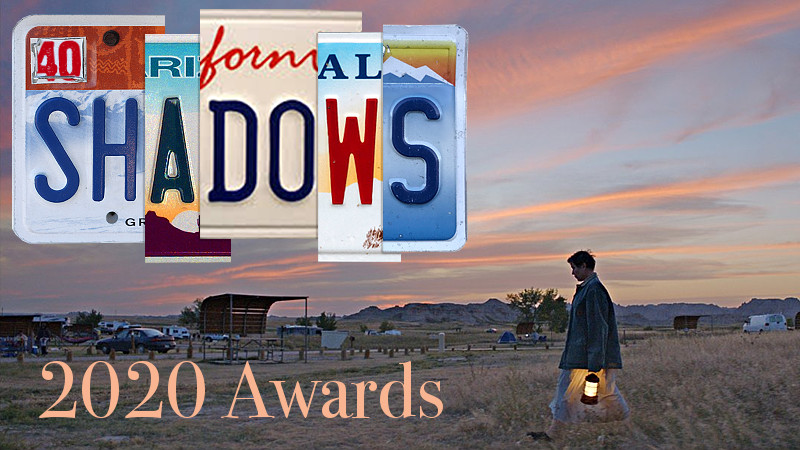| SHADOWS ON THE WALL | REVIEWS | NEWS | FESTIVAL | AWARDS | Q&A | ABOUT | TALKBACK | |||||
 Shadows off the beaten path Shadows off the beaten pathIndies, foreign, docs and shorts...
On this page:
DAVID BYRNE'S AMERICAN UTOPIA |
IF IT WERE LOVE |
NOTTURNO
| |||||
| See also: SHADOWS FILM FESTIVAL | Last update 19.Oct.20 | |||||
|
David Byrne’s American Utopia Review by Rich Cline | 
| |||||
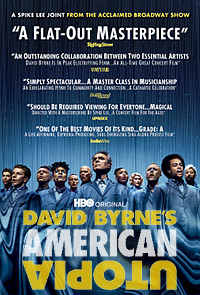 dir Spike Lee scr David Byrne prd David Byrne, Spike Lee with David Byrne, Chris Giarmo, Tendayi Kuumba, Mauro Refosco, Daniel Freedman, Jacqueline Acevedo, Tom Kieper, Gustavo Di Dalva, Stephane San Juan, Bobby Wooten III, Angie Swan, Karl Mansfield release UK Oct.20 lff, US 17.Oct.20 20/US Universal 1h45 TORONTO FILM FEST  Now streaming... |
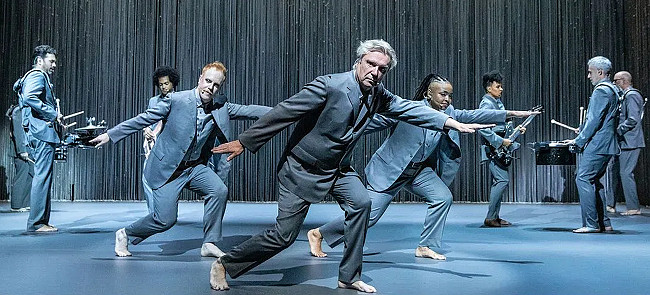 A filmed version of David Byrne's triumphant 2019 Broadway show, this is a musical and visual extravaganza photographed and edited with precision. Director Spike Lee brings the audience right on-stage to become a part of the performance, drawing out the concert's striking exploration of the highs and lows of US society. The film will thrill Byrne's fans, and should also spur newcomers to take a dive into his catalog. Byrne's music is knowingly cerebral, exploring thoughts and attitudes, feelings and perceptions. His opening question looks at how we lose neural connections in our brains as we grow up, so does this mean that we're getting stupider as we age? Or is this how we develop our distinct selves? As he introduces each musical number, Byrne takes us on a journey into our attitudes and perceptions. His words and lyrics bristle with open-hearted wit, sarcastic but never cynical. Which makes the show remarkably hopeful. As Byrne speaks directly to the audience or breaks into choreographed song, he's accompanied by a group of 11 lively singers, musicians and dancers. The stage is simple but makes inventive use of lighting and textures. And Ellen Kuras' cinematography combines wide shots and close-ups, static cameras and hand-held ones, offering context and intensity in a way that's involving and often exhilarating. Some angles catch glimpses of audience members engaging with the artists, and there's a cool backstage moment at the end. Songs included here traverse from Talking Head classics like Once in a Lifetime and Road to Nowhere to more recent hits like 2004's Lazy. Byrne's vision for the show was to simply have people performing for people, so everyone on-stage wears the same grey suit with bare feet. And Annie-B Parson's choreography has the same wonderfully jagged-edged quality as Byrne's music, to create a heady brew of joy and anger, curiosity and yearning for that One Fine Day that shouldn't be this difficult to achieve. Byrne never shies away from bold issues. He refers to the fact that he and most of his band are immigrants, and how so few people actually vote in elections, determining everyone else's future. There's a reverent nod to Colin Kaepernick, and a cover of the protest song Hell You Talmbout, demanding that victims of racist violence be named, a powerful sequence that's expertly augmented by Lee. As Byrne notes, it's a song about change, not just out on the streets, but also inside each of us.
| ||||
|
If It Were Love Si c’Était de l’Amour Review by Rich Cline | 
| |||||
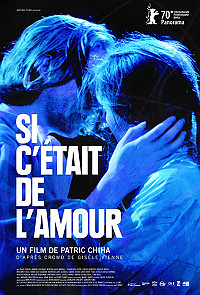 dir Patric Chiha scr Gisele Vienne prd Charlotte Vincent with Gisele Vienne, Philip Berlin, Marine Chesnais, Kerstin Daley-Baradel, Sylvain Decloitre, Sophie Demeyer, Vincent Dupuy, Massimo Fusco, Nuria Guiu, Remi Hollant, Antoine Horde, Georges Labbat, Oskar Landstrom, Theo Livesey, Louise Perming, Katya Petrowick, Richard Pierre, Anja Rottgerkamp, Jonathan Schatz, Henrietta Wallberg, Tyra Wigg release Fr 4.Mar.20, US Aug.20 off, UK Oct.20 lff 20/France 1h22 BERLIN FILM FEST  Now streaming... |
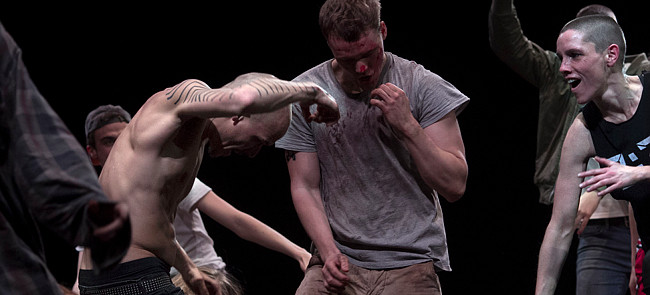 Much more than a concert film, this kinetic documentary captures Gisele Vienne's dance piece Crowd as it tours around France celebrating youthful energy and the body, connection and abandon. In addition to the elaborate interaction on-stage, filmmaker Patric Chiha is also exploring how these performers relate to each other behind the scenes, skilfully finding the points where their characters blur with who they really are. On a stage strewn with soil and litter, 20 young dancers from a range of backgrounds perform in mesmerising slow motion, like a surreal 1990s rave on a midnight beach. Their director (Vienne) coaches them to give into the ecstasy of the moment, connecting with each other and the environment, catching beats in unison as they touch or pull apart, sometimes accelerating to full-speed. When not performing, they get to know each other, flirting, teasing and of course gossiping about their various hookups. Strikingly shot by Jordane Chouzenoux, the film opens backstage, as dancers already moving at reduced speed are hosed down before heading into the performance space, adding to the muddy festival vibe. The performance is shot beautifully, mixing wide shots with close-up, while cutting back and forth between rehearsals and the fully staged show. It's fascinating to watch the interplay off-stage, which of course is reflected in the piece itself as it depicts an explosion of energy and inter-connection, including some very intense moments. Because of the deliberately reduced speed of their performance, there's an overpowering tactile physicality to the way they dance with each other. And then backstage we see other kinds of interaction, including conversations about hobbies, the highs and lows of relationships, the roles we play in real-life to throw people off the scent of our truth. One guy talks about playing the womaniser while he secretly lusts after the boys. Another speaks of using the pain of life to add emotion on the stage. With this exhilarating piece, Vienne is deliberately evoking a range of sexualities, relationships and interactions, refusing to indulge in audience expectations. It's a bracing depiction of youthful connections, both one-to-one and in a group setting. Each of these performers is engaging, and they open up on-screen with remarkable intimacy. They're playing characters, but they're also bringing themselves with them into their roles, which is essentially what each of us is doing every day.
| ||||
|
Notturno Review by Rich Cline |  MUST
MUST  SEE SEE
| |||||
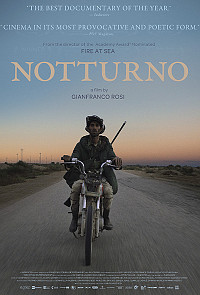 dir-scr Gianfranco Rosi prd Donatella Palermo, Gianfranco Rosi, Paolo Del Brocco, Serge Lalou, Camille Laemle, Orwa Nyrabia, Eva-Maria Weerts with Ali Ali, Mohamas Ali Monajed, Marwa Monajed, Abed El Hay, Bilal Ali, Bachir Maroun, Murtadah Jabbar Bedan, Kariem Abdullah, Ahmed Mohammed, Mayade Mhammod, Kifah Nuri, Walid Hamdon release It 9.Sep.20, UK Oct.20 lff 20/Italy 1h40 TORONTO FILM FEST  Now streaming... |
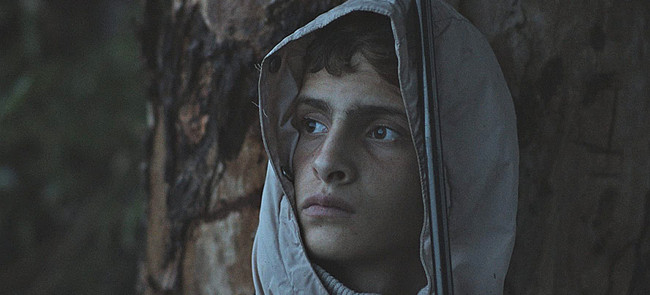 Shot over three years in Syria, Kurdistan, Iraq and Lebanon, this masterful documentary by the gifted Gianfranco Rosi immediately reminds us of the intensely personal stories behind headlines about war. This film digs deeply beneath the news to recount the human impact of political and religious violence. Shot by Rosi like a particularly beautiful narrative feature, it has elements of family drama, adventure and heart-stopping thriller woven into it. After the first World War, Western powers drew borders in the Middle East that have led to a century of tyranny, terrorism and invasions. Generations later, people are still paying the price for these arbitrary decisions. Kurds remain stateless, persecuted from every side, and nations remain locked in brutal civil wars that are more about power-grabbing than religious convictions. But the film's focus is on how individuals learn to cope within this volatile situation, getting on with life while trying to find a glimmer of hope. The film opens with mothers grieving over lost children, wishing they were dead instead. A man with a gun takes a boat into the reeds before the sun rises. A couple in love has a romantic date atop a building overlooking the city. An armed teenager watches over the family's fields, while young female soldiers patrol a quiet outpost. A small cinema shows newsreel footage of vicious battles before rehearsing and staging a passionate play about their national history. In the rubble of once-great cities, families mourn lost loved ones. Their expressive voices and faces are haunting. Rosi is skilled at finding raw beauty even in the most horrific situation (see also his 2016 masterpiece Fire at Sea). His camerawork here is often staggeringly gorgeous, fluidly edited (by Jacopo Quadri) without commentary. So a series of small narratives emerge within the larger story, including the heartbreaking perspective of children who describe growing up surrounded by violence. Their drawings are horrific but important. And they're followed with deliberate irony by shots of orange-clad Dayesh militants in prison. In each strand, there's a vivid sense that nobody knows what the future will be. They yearn for liberation from war, self-rule and the freedom to simply live their lives. They love their homelands, but their days are filled with desperation, fear, death and callous disregard from the world beyond their borders. And they are under no illusions about who created this mess to begin with, and who continues to pour fuel on the fire.
| ||||

See also: SHADOWS FILM FESTIVAL © 2020 by Rich Cline, Shadows
on the Wall
HOME | REVIEWS | NEWS | FESTIVAL | AWARDS
| Q&A | ABOUT | TALKBACK | | ||||

